Picture this: you’re on an exciting family road trip, everyone’s having a blast, when suddenly, you notice your child feeling unwell. Car sickness, a frequent form of motion sickness, can swiftly transform a fun journey into an uncomfortable ordeal.
My son started having car sickness when he was six months old. As of today, he is 14 months old and still suffering from motion sickness. However, we know how to prevent it now and make long drives more fun with family.
Let’s dive into understanding car sickness in children, its signs, and various strategies to manage and prevent it, ensuring smooth rides and happy travel memories.
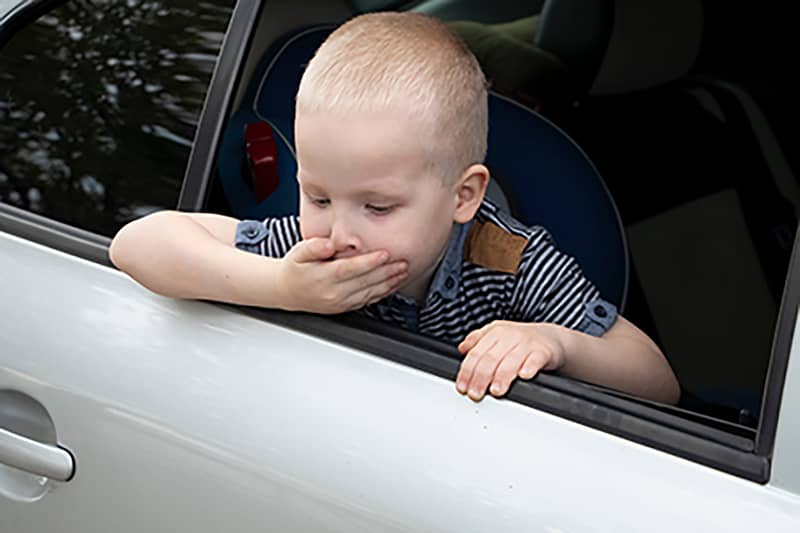
Car sickness is a motion sickness caused by a mismatch between visual and sensory signals, often affecting children of any age, along with adults. When the brain receives conflicting information from the inner ear, eyes, and other body sensors, it can lead to motion sickness symptoms like nausea and vomiting, making one feel sick.
Knowing what causes car sickness and how to prevent it is super important. There are many ways to stop it, such as using the medicine you can buy at the store, pressing on certain parts of your body, or focusing on something that doesn’t move.
But if your baby is under two years old, medications are mostly not recommended, at least in the US. But don’t worry, other methods are equally, if not more effective.
Recognizing the symptoms of car sickness can help you take action to mitigate their impact on your journey. Common symptoms of car sickness include:
These symptoms arise due to a conflict between the inner ear and visual signals, which can be exacerbated by certain conditions or triggers.
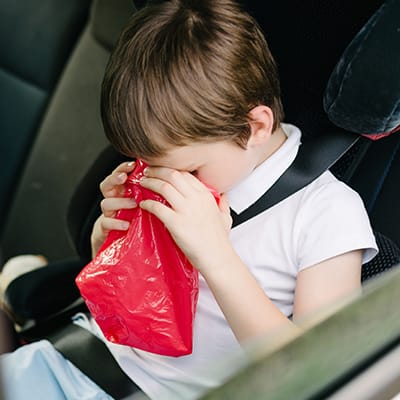
If your child is irritated or crying after 15 minutes of being on the road, it may be that they are feeling car sickness. Younger babies can’t tell what they feel, so watch out for these symptoms.
Let’s talk about how to keep car sickness at bay. It’s all about caring for your baby and reducing things that can trigger it.
Letting in fresh air and keeping the car well-ventilated is a simple way to help with car sickness. A breath of fresh air can help to calm your stomach and cool you down. So, crack open those windows or turn on the AC or a fan to keep the air moving. This can make the car ride more comfy and help prevent car sickness.

Taking a window seat or facing forward while traveling can also help minimize symptoms by synchronizing the inner ear senses with visual cues. Sometimes, this is true if your baby is in a rear-facing car seat. Now, I don’t advise you to use a front-facing car seat if your child doesn’t qualify, but that’s what we did for our son, and it helped tremendously. Consult with a car seat consultant (CPST) if this is advisable in your situation.
Consumption of light snacks and maintaining hydration can prevent car sickness. Easy-to-digest foods like crackers, pretzels, or dry cereal can assist in treating nausea. Drinking water can also help alleviate car sickness by reducing nausea and dizziness.
Avoiding car sickness symptoms can be achieved by following these tips:
Engaging in distractions or relaxation techniques can help reduce car sickness symptoms. Some strategies to try include:
These activities distract from the car’s motion, thus helping to prevent car sickness.
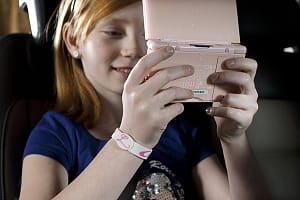
Some activities should be avoided as they further conflict with the inner ear and visual cues.
Normally kids would love to do these activities, however, for kids with motion sickness, these activities may increase symptoms.
So avoid any activities requiring your child to focus inside the car for longer. It’s better to look at the road and outside the car frequently to feel less of a motion sickness.
Some specific natural remedies are effective, especially for your child younger than 2 years old. At least in the US, there are no over-the-counter medications for those under 2 years old, or you can’t explain the tips and tricks we discuss above to prevent the sickness.
Our son started having the symptoms at 6 months, and we have personally used these natural remedies. So there are two natural remedies: acupressure bands and aromatherapy could be the answer.
Acupressure bands are wristbands designed to help relieve nausea and motion sickness by stimulating specific pressure points on the wrist. These bands work by applying pressure to the Nei-Kuan acupressure point, which is believed to reduce nausea.
Clinical studies have shown that acupressure bands effectively relieve car sickness symptoms without causing drowsiness or other side effects. They provide a non-invasive, drug-free solution for those seeking a natural remedy for motion sickness.
We use this for our son, which works around 90% of the time. I am not claiming that it completely cures car sickness. However, it happens way less frequently now. With acupressure bands and some of the tips we discussed, it is possible to successfully manage car sickness until it naturally disappears (hopefully!!).
When it comes to car sickness, aromatherapy can be a real game-changer. Essential oils like peppermint or ginger can make the ride much more comfortable. You can either breathe them in or put a little on your wrists, temples, or behind your ears. This can help you feel less sick.
But remember, too much of a good thing can be harmful. If you use too much, strong scents can sometimes make things worse. So, use these oils wisely, and you’ll be able to enjoy your road trips a lot more.
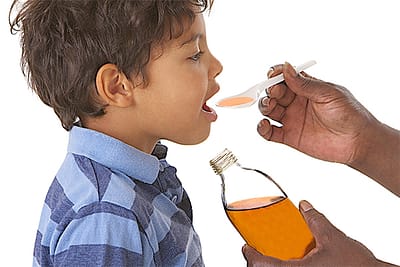
Over-the-counter medications like Dramamine, Benadryl, and Antivert can relieve car sickness symptoms. These motion sickness medicine options work by blocking the signals that trigger motion sickness, helping to alleviate nausea, vomiting, and dizziness.
This can be the option if your child is over 2 years old, at least in the US. Over-the-counter medications for motion sickness are not recommended for kids younger than 2 years old.
Remember, these over-the-counter drugs might make you a bit sleepy. So, before you pop one of these pills, you should talk to your doctor or pharmacist. They can tell you if these meds are the right choice for you and if they’ll play nice with any other meds you’re taking.
Using these medications responsibly can help treat nausea and manage car sickness symptoms effectively for a smoother journey.
For more severe cases of car sickness, prescription medications like scopolamine and promethazine may be necessary. These medications can be highly effective in treating car sickness. Still, they should be discussed with a doctor before use to ensure they’re appropriate for your needs.
Dosage recommendations for promethazine vary based on age, with specific guidelines for adults and children. As with any medication, consulting a healthcare provider before administering these drugs is essential to ensure their safety and effectiveness.
Car sickness in kids may add extra hassle for parents, mainly if they are young and cannot communicate. However, based on the tips and remedies we discussed, it’s manageable, especially if you are prepared for the worst possible scenario.
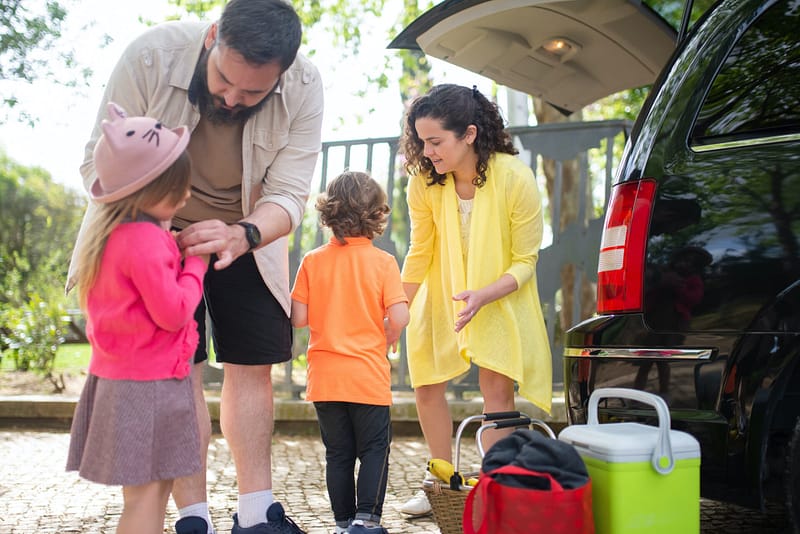
Don’t freak out if your little one gets sick in the car while you’re driving. Find a safe place to pull over. First, make sure your child is okay. It can be scary for them, especially when they’re very young. Take them out of the car seat, change their clothes, and let them get some fresh air. Once they feel better, you can clean up the mess before hitting the road again.
Here’s a list of things you’ll want to have on hand if your child gets car sick. Trust me, having these items ready to go will save you a lot of stress when the going gets tough.
Virtual reality experiences and amusement park rides can also induce motion sickness, as they can create similar conflicts between the inner ear and visual signals. The same prevention and treatment methods used for car sickness can be applied to these situations, such as taking medications, using acupressure bands, or practicing relaxation techniques.
Understanding the causes and solutions for motion sickness in various scenarios can enhance your ability to prevent motion sickness, manage symptoms, and enjoy a broader range of experiences comfortably. By avoiding motion sickness, you can ensure a more pleasant journey, whether it’s by land, sea, or air.
So, what’s the deal with car sickness? It’s a type of motion sickness that can make travel a real bummer. But don’t worry; once you understand why it happens and the symptoms, you can do a lot to stop it from ruining your trips.
You can use over-the-counter meds, prescription drugs, or natural remedies or mix and match these options. The important thing is to be ready and stay ahead of it. With some planning, you and your kiddo can beat car sickness and make every trip fun.
Get notified about new travel tips and hacks